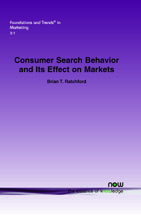Consumer Search Behavior and Its Effect on Markets
By Brian T. Ratchford, Charles and Nancy Davidson Professor of Marketing, University of Texas at Dallas, USA, btr051000@utdallas.edu
Abstract
The purpose of this review is to provide an overview of various literatures related to consumer search for information, and its effect on markets. Normative models of consumer search prior to purchase, and of consumer search through experience, are reviewed first. Models of consumer consideration set formation are also outlined. These models are generally based on consumers balancing the costs and benefits of search, which implies that search should be limited if it is costly. The extensive empirical literature on consumer search, which is reviewed next, does indicate that search is limited. The third major section of this review discusses the effect of search on market equilibrium, and market forces related to the supply of information. These include models of how advertising, retailing, and the Internet become organized to facilitate consumer search. The review concludes with a discussion of overall findings and suggestions for further research.
Consumer Search Behavior and its Effect on Markets
Consumer Search Behavior and its Effect on Markets focuses on the consumer side of the market, on what is known about how consumers search for needed information, and on how this impacts the behavior of markets. The author discusses three broad strands of this literature – normative models of search and their application to consumer search; empirical studies of the search process; and implications of consumer search for the behavior of markets, including pricing, advertising and retailing. In general, the author examines external search – the search for information from sources other than memory. Particular attention is paid to the impact of the Internet on markets. Consumer Search Behavior and its Effect on Markets also examines the broader issues about alternatives considered, sources consulted, extent of consumer knowledge, and the impact of these factors on markets and marketing institutions.
